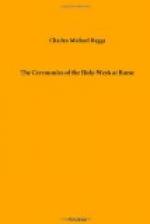[Sidenote: Conclusion.]
Having now considered in detail the various ceremonies of Holy Week at Rome, a philosophic mind will take a general review of them: and this question will very naturally suggest itself: What judgment ought I to form concerning them? am I to consider them as mummery, or superstition, or idolatry, as many most confidently pronounce, who are unacquainted with their nature, their origin, and their meaning; and at the same time are little accustomed from early infancy to any language or gesticulations save those of the tongue? or am I not rather to regard them as a solemn, and sacred, and pathetic, and most ancient expression of Christian faith and Christian feeling; which, united as it is with the noblest productions of divine inspiration and of Christian art may haply not only instruct and elevate the mind, but also enkindle in the soul flames of that pure and practical devotion, which this holy season demands from every follower of Christ? Let the reader decide for himself; but for our part, we envy not the mind or heart of him, who can prefer the former of these views. We shall ever bless God, that we have learnt in another school not to condemn the customs and manners of other countries and other people, merely because they differ from our own; and that we are disposed to attribute to signs the meaning attached to them by those who adopt them, and not that of our own fancies. Men of warmer climates than our own convey to others their sentiments and feelings by action as easily as by the tongue. Italians, as well as Greeks and Orientals, have inherited from their fathers a language of gesture more powerful and expressive than that of words. The Hebrew prophets, Isaiah, Ezechiel, and others, nay Christ himself, spoke by action as well by the tongue. God appointed in the old law innumerable ceremonies: Christ in the new law of spirit and truth instituted sacred rites, or sanctified those which previously




